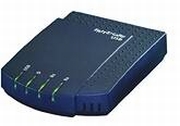Kapitel:
Fritz!Card USB v2.1 |
 |
Im Folgenden wird die Installation eines 'CAPI 2.0' für USB-ISDN-Adapters des Typs: 'AVM FRITZ!Card USB v2.1' unter Debian gezeigt. Dabei werden die Debian GNU/Linux Versionen 3.1 (Sarge) und 4.0 (Etch) berücksichtigt.
Installation unter Debian 3.1 (Sarge)
Die folgende Installation wurde mit dem Debian 3.1 (Sarge) Standard-Kernel '2.6.8-2-386' ausprobiert. Im genannten Standard-Kernel sind die CAPI-Eigenarten bereits im berücksichtigt, d.h. der Kernel brauch nicht neu übersetzt werden. Die Treiber für den ISDN-Adapter: 'AVM FRITZ!Card USB v2.1' können auf der Seite von AVM herunter geladen werden:
Es sollte dabei die neuste Version des Treibers verwendet werden.
Mit folgenden Kommandos kann nun der CAPI-Treiber installiert werden:
apt-get install kernel-image-2.6.8-2-386 kernel-headers-2.6.8-2-386
cd /usr/src
ln -s /usr/src/kernel-headers-2.6.8-2-386 /usr/src/linux
wget ftp://ftp.avm.de/cardware/fritzcrdusb.v20/linux/suse.93/fcusb2-suse93-3.11-07.tar.gz
tar xzvf fcusb2-suse93-3.11-07.tar.gz
cd fritz/
./install
apt-get install isdnactivecards
cp /usr/src/fritz/fus3base.frm /etc/isdn/
Zum Schuss muss noch die Datei '/etc/isdn/capi.conf' editiert werden:
|
/etc/isdn/capi.conf |
| # card
file proto io
irq mem cardnr options #b1isa b1.t4 DSS1 0x150 7 - - P2P #b1pci b1.t4 DSS1 - - - - #c4 c4.bin DSS1 - - - - #c4 - DSS1 - - - - #c4 - DSS1 - - - - P2P #c4 - DSS1 - - - - P2P #c2 c2.bin DSS1 - - - - #c2 - DSS1 - - - - #t1isa t1.t4 DSS1 0x340 9 - 0 #t1pci t1.t4 DSS1 - - - - #fcpci - - - - - - #fcclassic - - 0x150 10 - - fcusb2 /etc/isdn/fus3base.frm DSS1 - - - - |
Für die 'AVM FRITZ!Card USB v2.1' ist die gelb markierte Zeile einzufügen.
Installation unter Debian 4.0 (Etch)
Die folgende Installation wurde unter Debian 4.0 (Etch) mit Standard-Kernel '2.6.18-4-686' ausprobiert, auch dieser Kernel ist die CAPI-Eigenarten geeignet. Bei Debian 4.0 (Etch) sollte jedoch andere Sourcen verwendet werden und die darin enthaltenen Patches berücksichtigt werden. Hier die Anleitung:
aptitude install linux-headers-$(uname -r)
aptitude install pppdcapiplugin
(aptitude install rpm) muss evtl. installiert werden; beinhaltet das Tool: 'rpm2cpio'
cd /usr/src/
wget http://opensuse.foehr-it.de/rpms/10_2/src/fcusb2-0.1-0.src.rpm
rpm2cpio fcusb2-0.1-0.src.rpm | cpio -i
tar xzvf fcusb2-suse93-3.11-07.tar.gz
cd /usr/src/fritz/
patch -p1 < ../fritz-tools.diff
patch -p1 < ../fritz-usb.diff
./install
cp /usr/src/fritz/fus2base.frm /etc/isdn/
cp /usr/src/fritz/fus3base.frm /etc/isdn/
Auch muss die Datei '/etc/isdn/capi.conf' entsprechend editiert werden.
|
/etc/isdn/capi.conf |
|
# card
file
proto io irq
mem cardnr options #b1isa b1.t4 DSS1 0x150 7 - - P2P #b1pci b1.t4 DSS1 - - - - #c4 c4.bin DSS1 - - - - #c4 - DSS1 - - - - #c4 - DSS1 - - - - P2P #c4 - DSS1 - - - - P2P #c2 c2.bin DSS1 - - - - #c2 - DSS1 - - - - #t1isa t1.t4 DSS1 0x340 9 - 0 #t1pci t1.t4 DSS1 - - - - #fcpci - - - - - - #fcpcmcia - - - - - - #fcusb - - - - - - #fxusb - - - - - - #fcclassic - - 0x150 10 - - #fcdsl fdslbase.bin DSS1 - - - - #fcdsl2 fdsl2base.bin DSS1 - - - - #fcdslsl fdssbase.bin DSS1 - - - - #fcdslslusb fdlubase.frm DSS1 - - - - #fcdslusba fdlabase.frm DSS1 - - - - #fcdslusb2 fds2base.frm DSS1 - - - - #fcdslusb fdsubase.frm DSS1 - - - - fcusb2 /etc/isdn/fus3base.frm DSS1 - - - - |
Die gelb markierte Zeile ist für die 'AVM FRITZ!Card USB v2.1' einzufügen.
Anmerkungen
Mittels folgender Kommandos kann nun das Modul geladen werden und der CAPI-Dienst gestartet werden:
modprobe -v fcusb2
capiinit
Mit dem Kommando 'capiinfo' kann die korrekte Installation geprüft werden, hier eine Beispiel-Ausgabe von 'capiinfo':
debian:~# capiinfo
Number of Controllers : 1
Controller 1:
Manufacturer: AVM GmbH
CAPI Version: 2.0
Manufacturer Version: 3.11-07 (49.23)
Serial Number: 0000000
BChannels: 2
Global Options: 0x00000039
internal controller supported
DTMF supported
Supplementary Services supported
channel allocation supported (leased lines)
B1 protocols support: 0x4000011f
64 kbit/s with HDLC framing
64 kbit/s bit-transparent operation
V.110 asynconous operation with start/stop byte framing
V.110 synconous operation with HDLC framing
T.30 modem for fax group 3
Modem asyncronous operation with start/stop byte framing
B2 protocols support: 0x00000b1b
ISO 7776 (X.75 SLP)
Transparent
LAPD with Q.921 for D channel X.25 (SAPI 16)
T.30 for fax group 3
ISO 7776 (X.75 SLP) with V.42bis compression
V.120 asyncronous mode
V.120 bit-transparent mode
B3 protocols support: 0x800000bf
Transparent
T.90NL, T.70NL, T.90
ISO 8208 (X.25 DTE-DTE)
X.25 DCE
T.30 for fax group 3
T.30 for fax group 3 with extensions
Modem
0100
0200
39000000
1f010040
1b0b0000
bf000080
00000000 00000000 00000000 00000000 00000000 00000000
01000001 00020000 00000000 00000000 00000000
Supplementary services support: 0x000003ff
Hold / Retrieve
Terminal Portability
ECT
3PTY
Call Forwarding
Call Deflection
MCID
CCBS
debian:~#
Die 'D-LED' am ISDN-Adapter sollte nun leuchten.
Weitere Infos
| AVM Cardware | ftp://ftp.avm.de/cardware/fritzcrdusb.v20/linux/ |
| CAPI 2.0 für die AVM Fritz!Card USB v2.1 unter Linux | http://www.stud.uni-karlsruhe.de/~ural/fritzusb.html |
| Hylafax unter Debian Sarge mit Kernel 2.6 einrichten | http://www.brueck-computer.de/index2.php?modul=1402&link=1 |
| Beitrag aus dem Debian-Forum | http://www.debianforum.de/forum/viewtopic.php?t=57757 |
| AVM FritzCard PCI unter Debian Etch einrichten | http://www.ico.de/supportbereich/showthread.php?t=49 |
| Cardware (AVM Treiber für OpenSuSE) geeigent für Debian 4.0 (etch) | http://opensuse.foehr-it.de/rpms/10_2/src/ |
letzte Änderung: 30. Juni 2007